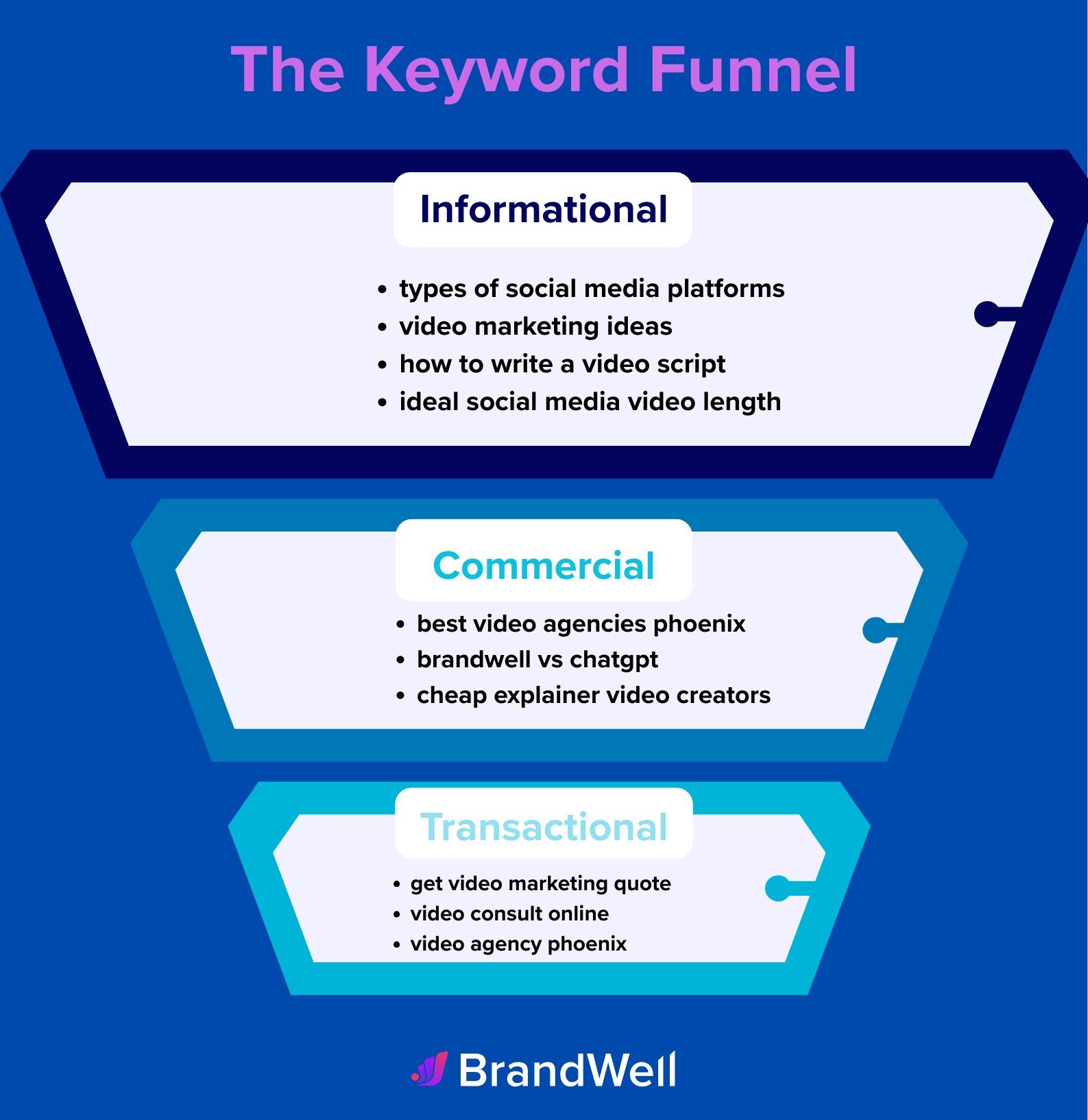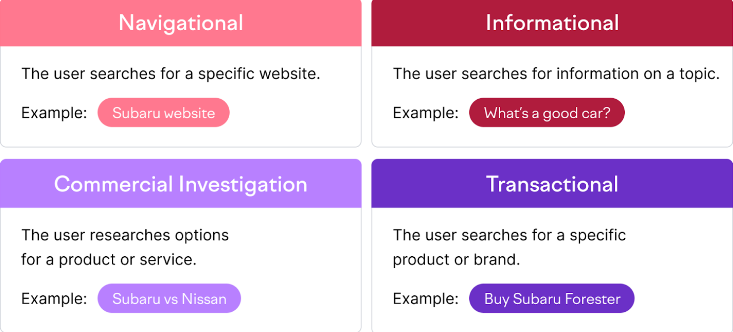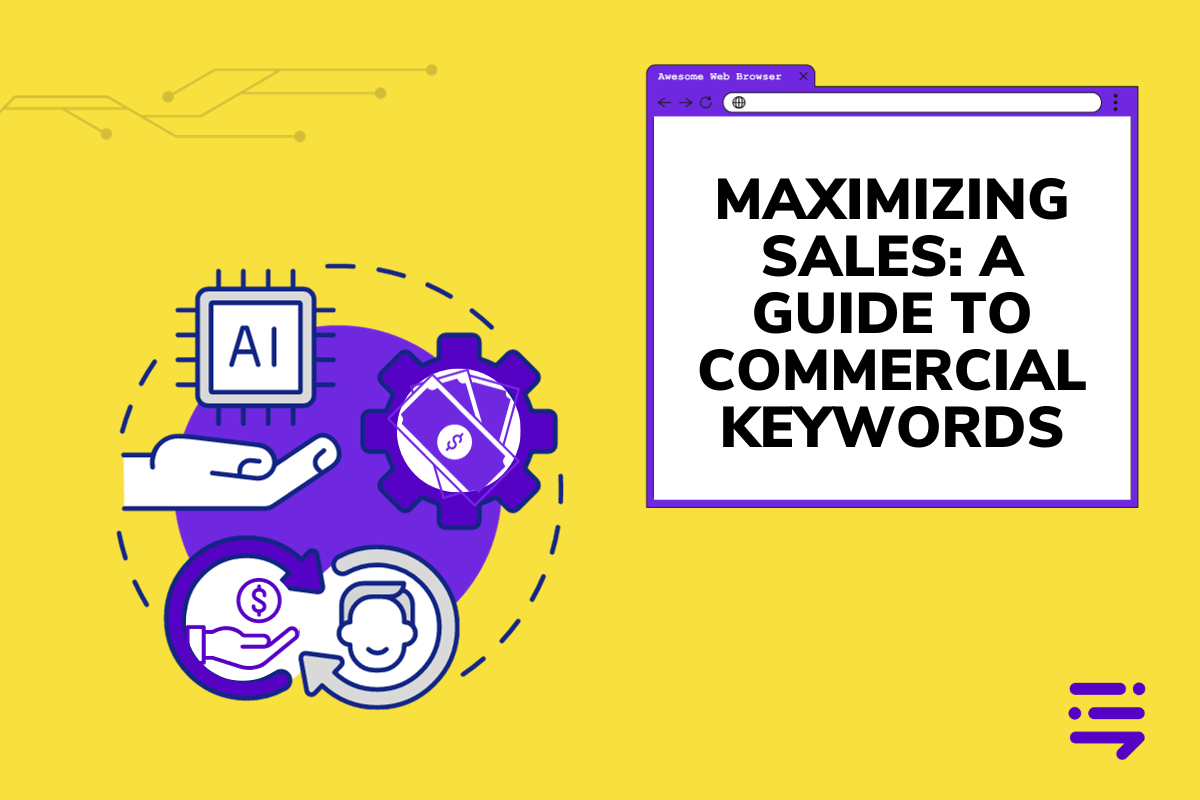Imagine this. You’ve poured your heart and soul into creating a stunning website for your new business venture.
You’re offering fantastic products, unbeatable deals, and stellar customer service. But somehow, you’re not seeing the web traffic or sales conversions you expected. What’s going wrong?
The answer could lie in something as simple yet critical as ‘commercial keywords‘.
Commercial keywords are just like those little breadcrumbs Hansel and Gretel used to find their way home – they guide potential customers straight to your digital doorstep.
This post is here to give you an all-access pass into the world of commercial keywords – what they are, how they influence consumer behavior, and strategies for finding effective ones that improve SEO rankings, drive traffic, and increase conversions.
Table Of Contents:
- What Are Commercial Keywords?
- Types of Commercial Intent Keywords
- Role of Commercial Keywords in SEO
- How to Find Keywords With Commercial Search Intent
- How to Add Commercial Keywords to Your Content
- Measuring the Success of Your Commercial Keyword Strategy
- Pitfalls to Avoid When Using Commercial Keywords
- FAQs – Commercial Keywords
- Conclusion
What Are Commercial Keywords?
Commercial keywords are search terms with high commercial intent. These are phrases that people type into Google when they are actively looking to make a purchase or engage in a transaction.
Commercial intent keywords signal a clear intention to buy, and they are often associated with products, services, or specific brands. Commercial keywords are often used in the later stages of the buying cycle when the prospective customer is moving beyond research and closer to making a decision.
Here are some examples of commercial keywords:
Buy [product name]: For example, “buy iPhone 13.”
Discount [product or service]: Like “discount laptops” or “cheap flights.”
Best [product type]: For instance, “best running shoes” or “best digital cameras.”
[Brand] [product]: Searches like “Nike running shoes” or “Samsung Galaxy smartphones.”
When someone uses commercial keywords in their search query, they’re telling us something crucial about themselves – that they’re ready to take action.
This sets them apart from informational queries like “How does a computer work?” or “What is organic farming?”
The keyword intent behind these questions is to dig for information. The user is not necessarily planning on making a purchase anytime soon.
Commercial intent keywords are crucial for businesses as they often represent users who are ready to convert. When optimizing for commercial keywords, businesses aim to ensure that their products or services appear prominently in search results, increasing the likelihood of attracting potential customers who are actively seeking to make a purchase.

Commercial intent keywords are often used in the middle of the funnel
Types of Commercial Intent Keywords
If you ever used the web to look for something to buy or avail of, then you have employed commercial keywords. They’re the bridge that connects your needs to businesses ready to fulfill them.
Let’s look at two types of commercial keywords based on search intent.
High-Intent Keywords
First up are high-intent keywords. These power phrases signal a user’s readiness to buy.
Phrases like “buy running shoes online” or “best price on Samsung Galaxy S21” indicate that users have their credit cards in hand and are near the end of their buying journey.
Low-Intent Keywords
In contrast, low-intent keywords show less immediate desire for purchase, but they shouldn’t be underestimated.
Comparison queries are a great example of low-intent commercial keywords. The user might want to compare different products or services without a clear decision to buy.
For example, “pros and cons of iPhone 13 vs. iPhone 14” or “compare car insurance rates.”
Reviews and ratings also fall under queries with low keyword intent. These are searches for reviews or ratings to assess the quality and reputation of a product or service.
Examples are “customer reviews of Nike Air Max” or “ratings for Sony LED TV.”
Commercial keywords cater to various stages of the buying process. Here are some more examples of commercial keywords:
Product Keywords: These include specific products or models that users are interested in purchasing. For example, “iPhone XR” or “LG OLED TV.”
Brand Keywords: Users searching for a particular brand with the intent to make a purchase. Examples include “Adidas running shoes” or “Samsung Galaxy S21.”
Price Keywords: Users looking for deals, discounts, or specific price points. For instance, “discount laptops” or “affordable fitness trackers.”
Location-based Keywords: Commercial searches with a geographical component, often indicating local intent. Examples include “Best restaurants in San Francisco” or “Buy vegan food near me.”
Seasonal or Event-based Keywords: Keywords tied to specific seasons, holidays, or events. For example, “Christmas gift ideas” or “Black Friday deals.”
Understanding the nuances of these commercial keywords helps businesses tailor their content, advertising, and SEO strategies to meet the specific needs and intentions of potential customers.
Remember each type serves its own purpose in driving traffic and conversions, so balance is key when incorporating different types of commercial keyword strategies.

This infographic illustrates the different types of keywords in one niche
Role of Commercial Keywords in SEO
The impact commercial keywords have on search engine optimization can’t be overstated. They are like the secret spices that chefs use to make their dishes stand out. Let’s explore how these ‘spices’ enhance your SEO strategy.
Boosting SERP Rankings
If you’ve ever wondered why some websites rank higher than others, part of the answer lies in their effective use of commercial keywords. These power words act as signposts guiding search engines toward understanding what your site offers and placing it appropriately on search engine results pages.
By choosing relevant commercial keywords, you’re telling Google where to put you — ideally at the top.
Fueling Organic Traffic
Besides ranking, there’s another crucial benefit: traffic generation. But not just any traffic — we want organic, high-quality visitors who are genuinely interested in our offerings. Using targeted commercial keywords, you can draw these users straight from SERPs to your website.
Driving Conversions
This is where things get exciting. It turns out that certain types of commercial keywords — specifically high-intent ones — are particularly good at converting visitors into customers or subscribers.
High intent means a keyword indicates a strong desire for action — a purchase or subscription perhaps — which helps meet business objectives more directly.
With such specific targeting capability using high-intent long-tail variations, it’s no wonder commercial keywords play a significant role in SEO.
Building Trust and Authority
Last but not least, by consistently using relevant commercial keywords throughout your content, you start building authority in your niche. You demonstrate to search engines that you are a reliable source of knowledge and have expertise in your field.
This trust leads to better rankings and more visibility on SERPs and ultimately attracts the right audience for conversion.
How to Find Keywords With Commercial Search Intent
Finding the right commercial keywords is a bit like hunting for treasure. You need a good map, patience, and some savvy tactics to hit the jackpot.
The Power of Keyword Research Tools
A solid starting point? Use a keyword research tool like Semrush or BrandWell. These can give you insights into monthly search volumes, keyword difficulty scores, and more. But remember — don’t just go for high-volume words; consider relevance and competition too.
Digging Into Your Competitors’ Strategies
Ever heard the saying “keep your friends close but your enemies closer”? Apply that wisdom here by investigating what keywords your competitors are ranking for. Here’s a quick guide on how to find them:
- Identify Your Competitors: Start by figuring out who your main competitors are in your niche or industry. These are the businesses or websites that offer similar products or services.
- Use Keyword Research Tools: There are various tools available that can help you spy on your competitor’s keywords such as Ahrefs, Semrush, and SpyFu.
- Check Their Content: Go through your competitor’s website, blogs, and other content. Look for recurring keywords in their titles, headings, and throughout the content. This can give you insights into the terms they are prioritizing.
- Explore Social Media: Check your competitors’ social media accounts. The hashtags and keywords they use in their posts can be indicative of their focus areas.
- Review Their Backlinks: Backlinks are an essential aspect of SEO. Tools like Ahrefs can also help you identify the backlinks pointing to your competitor’s site. Analyzing the anchor text in these backlinks can reveal the keywords they are emphasizing.
- Set up Google Alerts: Set up Google Alerts for your competitors’ names, products, or services. This way, you’ll receive notifications whenever they are mentioned online, and you can see the keywords associated with their brand.
Once you’ve identified the keywords your competitors are targeting, you can assess the competitiveness of those phrases and determine if there are any gaps or underserved areas where you can shine.
Tapping into Long-Tail Keywords
Long-tail keywords might not get as much traffic as their shorter counterparts but they often boast higher conversion rates because they’re more specific. Try finding these hidden gems with a tool like AnswerThePublic.
A few tips on finding long-tail keywords with commercial intent:
- Check E-commerce Platforms: If you’re running an e-commerce business, explore platforms like Amazon, eBay, or Etsy. The search terms users use on these platforms often indicate a strong intent to purchase.
- Consider Location-Based Keywords: Include location-based terms in your keyword research, especially if you have a physical store. People often include their location when searching for products or services they intend to buy locally.
- Think Like Your Customer: Put yourself in your customer’s shoes. What specific phrases or questions might they type into a search engine when they are ready to buy? Tailor your keywords to match these real-world search queries.
Leveraging Google’s Suggestions
You know those suggestions that pop up when you start typing in Google’s search bar? They’re gold mines for finding keywords with commercial intent. When you start typing a query into the Google search bar, it automatically suggests relevant phrases that people commonly use.
For example, if you’re writing a blog about healthy recipes, start typing “healthy recipes” into the Google search bar, and you’ll likely see suggestions like “healthy recipes for weight loss” or “easy healthy recipes.” These suggestions can give you insights into what people are actively searching for, helping you tailor your content to meet those specific needs.
How to Add Commercial Keywords to Your Content
You might be wondering how to fit commercial keywords naturally into your content. It’s not as hard as you think.
Step 1: First, understand the context of your keyword. Is it a product name? A service type? Knowing this will help guide where and how often you use these terms.
Step 2: Make sure your content is relevant to the keyword. This sounds simple, but too many times we see people trying to stuff unrelated keywords into their content just for SEO purposes.
Step 3: Use synonyms and related phrases. Search engines are smart enough to recognize when you’re talking about something without having to repeat the same phrase over and over again.
Step 4: Add your keywords to headings and subheadings. These text breaks present an excellent opportunity for naturally incorporating commercial keywords. To do this effectively, make sure each heading or subheading provides value by accurately describing what follows while including the targeted commercial keywords.
Step 5: Add your keywords to the meta description. Your meta description acts like an elevator pitch for any given webpage; therefore, strategically placing commercial keywords here can be highly beneficial. But remember – don’t sacrifice readability or relevance just to squeeze in more words.
Avoid Keyword Stuffing: Quality Over Quantity
Avoid keyword stuffing when adding keywords to your content. Search engines penalize this behavior. Your focus should be on providing high-quality, useful content that incorporates keywords naturally.
Quality over quantity is the golden rule when it comes to using commercial keywords. It’s not about the frequency of including your keywords but ensuring that they are adding value to your content.
Measuring the Success of Your Commercial Keyword Strategy
Let’s face it, you’ve put a lot of work into identifying and incorporating commercial keywords. But how do you know if your efforts are paying off? Here are four key metrics to keep an eye on:
Traffic Volume: The first metric to check is traffic volume. You can use tools like Google Analytics for this purpose. If more people are visiting your site after implementing new keywords, that’s a good sign.
Bounce Rate: Bounce rate refers to visitors who leave your website quickly without interacting much. If your bounce rate is high, maybe the keyword attracted them but they didn’t find what they were looking for.
Conversion Rates: You’re not just trying to attract eyeballs; you want action. Check out whether users complete desired actions like making purchases or signing up for your newsletter.
SERP Ranking: A great indicator of success is seeing improvement in your rankings on search engine results pages. Tools like Ahrefs’ Keywords Explorer can help track these changes over time.
Remember, every business and campaign will have different goals and metrics may vary accordingly. So keep an eye on these key indicators and adjust strategies as needed.
Just one final note – don’t expect overnight results. SEO improvements take time so be patient but persistent.
Pitfalls to Avoid When Using Commercial Keywords
Navigating the world of commercial keywords can be a bit tricky, but fear not!
Here are some pitfalls to watch out for:
- Overlooking User Intent: Commercial keywords are not just about transactions; they’re about solving a problem. Don’t get so focused on the sale that you forget the user’s intent. Ensure your content aligns with what the user is looking for.
- Ignoring Search Volume: While high commercial intent is crucial, you still want a decent search volume. Avoid keywords that are too niche and have extremely low search traffic, as this might limit your reach.
- Neglecting Long-Tail Keywords: While short, high-volume keywords can be tempting, don’t ignore the power of long-tail keywords. They might have a lower search volume, but they often convert better because they are more specific.
- Focusing Solely on High-Competition Keywords: It’s tempting to go after the high-competition, high-search-volume keywords, but these can be tough to rank for. Balance your strategy by targeting a mix of high, medium, and low competition keywords.
- Forgetting About Mobile Users: With the increase in mobile searches, make sure your website is mobile-friendly. If your site isn’t optimized for mobile users, you might lose potential customers who quickly bounce from a non-responsive site.
- Ignoring Negative Keywords: If you’re running paid advertising campaigns, pay attention to negative keywords. These are terms for which you don’t want your ads to appear. It helps to filter out irrelevant traffic and save your budget for more valuable clicks.
- Not Staying Updated: The world of SEO and keywords is ever-evolving. Stay updated with industry trends, algorithm changes, and shifts in user behavior to ensure your strategy remains effective.
FAQs – Commercial Keywords
What is an example of a commercial intent?
A prime example of commercial intent is when someone searches “buy running shoes online.” They’re clearly ready to purchase.
What are examples of keywords?
“Organic baby food,” “best smartphone 2023,” and “easy vegan recipes” are all keyword examples, signaling specific search interests.
What are keywords in business?
In business, keywords like “affordable CRM software” or “top marketing agencies NYC” help firms get spotted by potential customers online.
What are examples of informational keywords?
“How to change a tire” or “symptoms of flu” are examples of keywords with informational intent. These users seek knowledge, not necessarily products or services.
Conclusion
Commercial keywords are your golden ticket. They’re like breadcrumbs that guide potential customers to your digital doorstep. You’ve come to understand their significance in the realm of online promotion.
You now know about different types of commercial keywords – high-intent and low-intent – and how each plays a unique role in driving traffic and conversions.
We’ve covered strategies for identifying effective commercial keywords. Now you can get going and make sure the right people see your material by incorporating these keywords.
But remember! Always measure success using various metrics and tools and be wary of common pitfalls when using these potent phrases.
Want to find commercial keywords and turn them into high-ranking content using only one tool? That’s what BrandWell can do for you!
Harnessing the power of commercial keywords can be a game-changer so sign up now!




